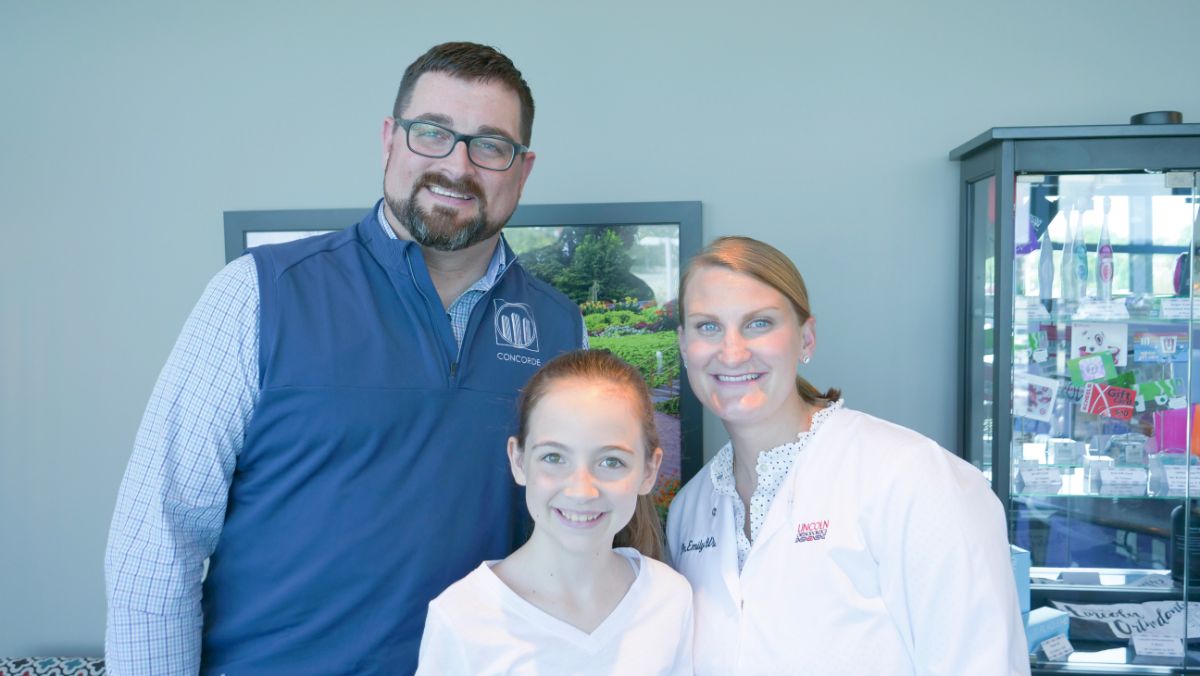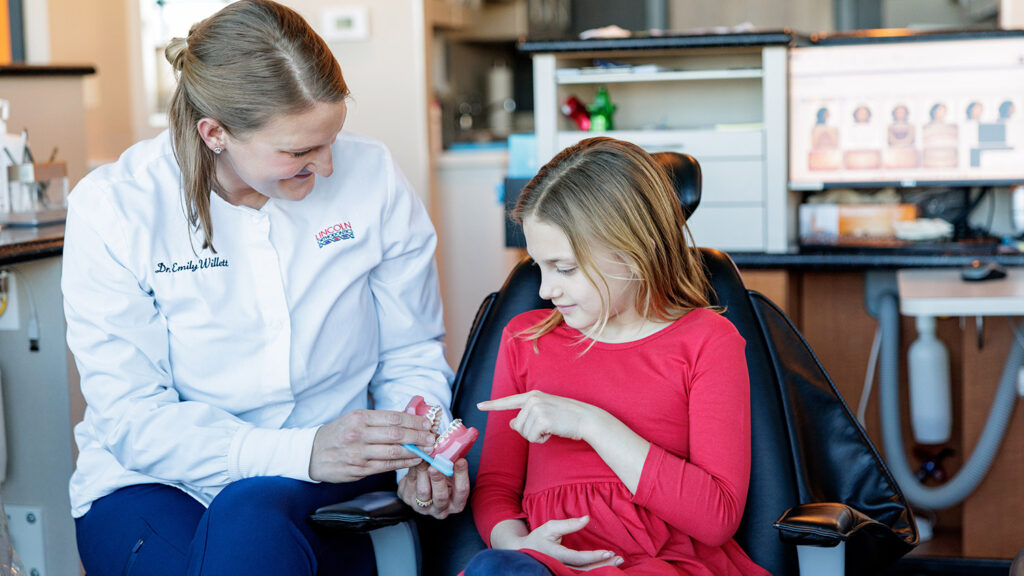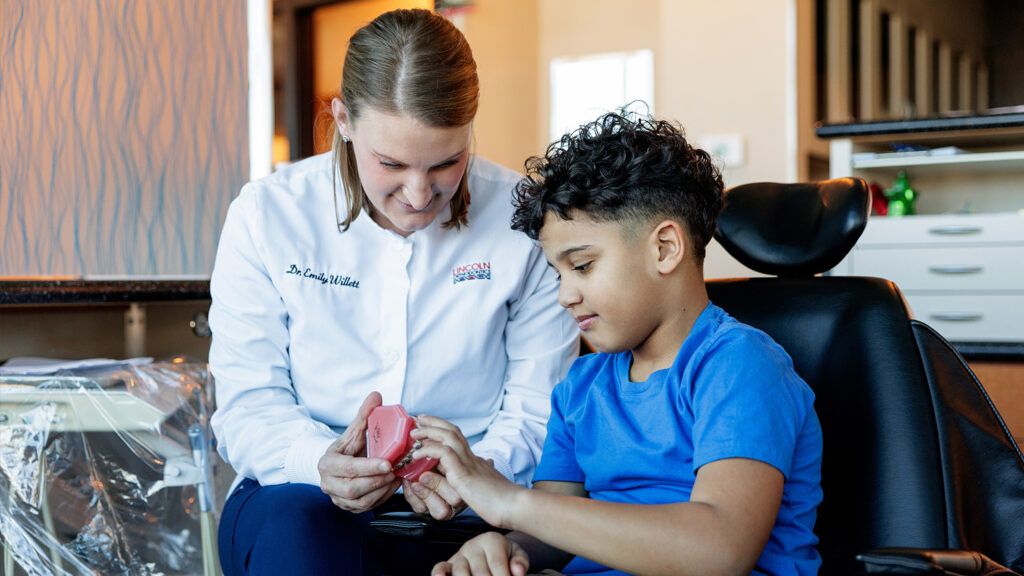Recognizing and Treating Your Child’s Orthodontic Issues
- May 29, 2021

Here at Lincoln Orthodontics, we often hear from parents who are curious about orthodontic treatment for their child. Some want to know if they should be seeing an orthodontist as often as a general dentist, while others wonder how to know if their child needs treatment. There are many factors we take into consideration when it comes to a child’s smile, including their age, the alignment of their teeth and jaw, their dental development, and their growth pattern and projection. An early orthodontic evaluation by an experienced orthodontist like Dr. Willett is the key to recognizing and treating your child’s orthodontic issues!
The American Association of Orthodontists recommends children have an orthodontic evaluation by the time they’re about seven years old, and we agree! Most kids this age will have enough dental landmarks in place that Dr. Willett can assess their teeth, bite, and jaw for normal development.
There are several common issues we’ll be looking for during this initial visit. If you’re a parent, it can be helpful to have a basic understanding of how these oral challenges can affect your child—and how we can correct them! Keep reading below to learn more.
Crowded teeth
Healthy teeth and gums are essential to good oral health, but if your child has crooked teeth, it can be difficult to brush and floss them effectively. This increases the chance of them developing tooth decay and cavities. Customized treatment with Lincoln Orthodontics can move the teeth into better positions in small increments over time, giving your child a smile that is easier to care for. It can also lessen facial tension and relieve difficulties with chewing and speech!
Missing teeth
Gaps between the teeth can exist because congenitally missing teeth never grew in, or they may be created when permanent teeth are lost due to injury or disease. If your child has missing teeth for any reason, we can use braces to move the existing teeth into the proper positions. Dr. Willett will then place a bonded bridge where the missing teeth would normally be. This method allows us to achieve an evenly-spaced smile for your child that looks good cosmetically and also functions the way it should!
Gapped teeth
Gapped teeth are common, especially in children, and can happen for a variety of reasons. Whether it’s due to genetics or bad oral habits like thumb sucking and extended pacifier use, we can create a personalized treatment plan to help close gaps in your child’s smile.
Open bite
With an open bite, the upper and lower rows of the front teeth don’t touch or close when smiling or chewing. Many open bites come from extended thumb sucking in childhood, which can cause the teeth to grow into a noticeably rounded formation.
Dr. Willett will usually treat an open bite with a combination of braces and an orthodontic appliance known as a “crib.” This device prevents the tongue from putting pressure against the anterior teeth when swallowing, which trains it to swallow correctly. This will align your child’s smile, allowing them to close their teeth and smile or chew with ease!
Deep overbite
When a child has a deep overbite, the lower teeth recede so far behind the upper teeth that they bite into the roof of the mouth and the upper front teeth overlap the lower front teeth. Out of all the bite disorders, a deep overbite is the most detrimental to the teeth and health of the jaw joints. It can also negatively affect a child’s face shape and appearance.
Treatment for a deep overbite may require orthodontics and restorative dentistry together, although orthodontics alone can sometimes be enough to correct it, depending on how severe the case is. Correcting a deep bite misalignment like this will restore the full functionality of your child’s teeth and greatly improve the appearance of their smile.
Underbite
An underbite occurs when the bottom teeth protrude in front of the upper teeth. This type of bite misalignment can cause pain at the jaw joint and the angled pressure can wear down some of the teeth. There are a few treatment options available here in our Lincoln office for children who have an underbite, including:
- an upper jaw expander, which can be widened nightly until treatment is complete
- a reverse-pull face mask, which wraps around the head and attaches to metal bands on the back upper teeth to pull the upper jaw forward
- traditional braces to adjust the misaligned teeth
Treatments like these will not only help relieve any pain and discomfort caused by the underbite, they’ll also make it easier for your child to smile, eat, and breathe more effectively.
Overjet
If a child has an overjet, their top front teeth will protrude far beyond the bottom front teeth. This is often referred to as “buck teeth.” Treatment for this issue is most effective when the child is diagnosed early, as this gives us the chance to guide tooth eruption to our advantage. Your child’s age and specific needs will determine the approach our doctors take, but the options will usually include:
- bite correction devices
- traditional braces
- removable orthodontic appliances
- tooth removal
- surgery
Whatever treatment ends up being best for your child, they’ll be left with a beautiful and balanced smile in the end.

Start a lifetime of healthy smiles with Lincoln Orthodontics
Your child deserves orthodontic care that’s as unique as they are! After their initial evaluation, Dr. Willett will create a customized treatment plan for them based on their specific needs, lifestyle, and goals. Our talented team is committed to providing every patient with a rewarding and stress-free experience, and we work hard to ensure your whole family feels comfortable in our Lincoln office from the moment you arrive until your last appointment!
If you been wondering if orthodontics could benefit your young child, we’d love to meet you both and take a look at their smile! Get in touch today to schedule a FREE consultation with Dr. Willett. We’ll work together to give your child the best start towards a lifetime of healthy smiles.


